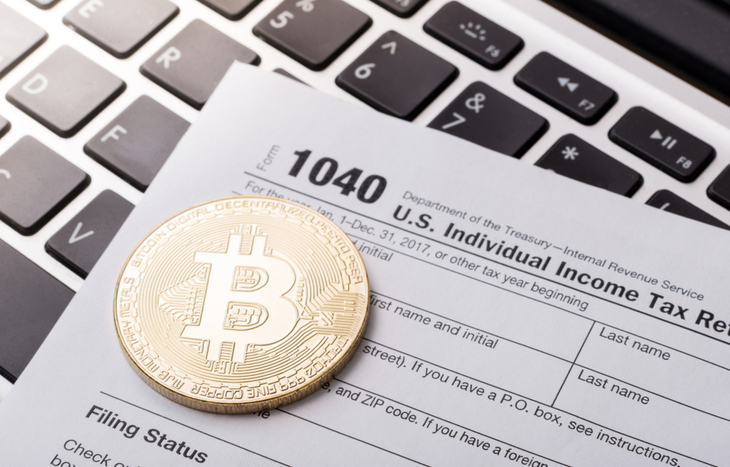Crypto Tax: How Virtual Currencies Are Treated in the U.S.
Any investor worth his salt knows that the tax man is always looming. And that goes for crypto investors too. But when it comes to crypto tax, it can get a little more complicated than your average stocks and bonds. Meanwhile, Congress is making a go at updating how the tax code will impact crypto investors. Here’s what you need to know…

Just as a reminder, crypto is still very new compared to other asset classes. It was only in 2019 that the Internal Revenue Service (IRS) explicitly asked whether it had any dealings with cryptocurrency. The question on form Schedule 1 asked, “At any time during 2019, did you receive, sell, send, exchange or otherwise acquire any financial interest in any virtual currency?” Thus, in its typically vague way, the IRS launched the first round of crypto tax.
Even at the time, it was largely seen as an afterthought. Plus, the question seemed purposefully ambiguous. And perhaps even more important, that form isn’t one that every individual usually needs to fill out. Form Schedule 1 is reserved for those that need to report income not listed on a regular Form 1040. Alimony, gambling winnings and capital gains are the usual reasons for pulling out that form.
The following year, the IRS finally started taking a crypto tax seriously. In 2020, the Schedule 1 question was moved to the more traditional 1040. That’s the one every tax filer should know. It’s used by all individuals filing an annual income tax return. In fact, it got top billing with a spot right after filers name and Social Security number. And that was that… For a while.
The Complications of a Crypto Tax
Come tax-filing season that year, crypto investors and the IRS learned an important lesson. Namely that not many people actually knew how to calculate capital gains and losses. Crypto had been around for more than a decade. And the IRS had issued its explanation back in 2014. It qualified crypto as property for Federal income tax purposes.
But crypto’s decentralized nature created a headache for both the government and “law-abiding” investors. It’s not like crypto exchanges were issuing tax documents back then. Nobody was expecting to see Form 1099-B in the mail outlining transaction proceeds. At best, a different form was sent out. One typically used to make it known if $20,000 in transactions took place. And this (Form-1099-K) doesn’t factor in how much the crypto cost. And that made it exceedingly difficult to calculate taxable gains or losses.
With some crypto exchanges like Coinbase going legit, that’s changed… To some extent. But the truth is crypto tax rules are still being ironed out. Let’s say you bought ten Solana tokens for $4 a token. And you sold them for $100. That would amount to $960 in taxable gains. That’s pretty straightforward. However, if you instead used some of your Solana to buy Cosmos crypto, is that a taxable event? Technically, the answer is yes. But it’s left up to the trader to figure out how to calculate it. They have to figure it out according to the IRS. It’s supposed to be treated as if the crypto that was used to buy another token was liquidated… Just as if any other piece of property was sold. And that can be a real pain the butt.
It Gets Worse
Let’s say you’re a crypto miner. This actually qualifies as self-employment income… At least in the eyes of Uncle Sam. Cryptocurrency miners have to pay taxes on the fair market value of any coins they mined at the time they receive them. And this tax rate generally varies between 10% and 37%. For more detailed help on how to navigate these waters, check out the TaxBit website. That site has partnered with the IRS to help with crypto tax-related audits.
At the TaxBit website, miners can learn how to get creative and minimize the crypto tax burden. There, you can learn how to classify mining as a business. This can allow deductions for equipment and even electricity expenses. But fair warning, it ain’t easy.
Then there are issues with interest earned on a crypto investment. Any interest earned from rewards or staking also count as income… And should be taxed as such. Some exchanges (Coinbase, for instance) now sends Form 1099-MISC to taxpayers that earned at least $600 for the coins sitting idly by and earning interest.
By now, it’s easy to see what a messy and tangled web the IRS has weaved. And why so many folks get it wrong. It’s as if it was designed to fail. In the process, it’s led to a slew of people overpaying their crypto taxes… And more likely than not, a whole lot of folks ignoring the process altogether. Needless to say, it’s hard to get much hard data about the amount of folks avoiding the government’s ability to reach into their crypto wallet.
And Then Congress Got Involved
In an attempt to fill a loophole some savvy crypto investors have taken advantage of, Democrats in the House of Representatives have proposed a bill. It won’t make tax season any easier. It won’t clarify the language used by the IRS either. Filing will still be a chore… Especially for those that use decentralized exchanges like PancakeSwap or the like.
Instead, house Democrat’s introduced what’s referred to as a “wash sale” rule. This means that crypto investors can’t claim a tax loss if they then go buy back the same coin or token in a set amount of time. It’s the same rule that applies to stocks, bonds and other securities. While not surprising… It is another example of the mixed language government agencies uses to define crypto. Again, the IRS treats crypto as property… not as a security. So, there is still a whole lot of confusion. If the crypto tax proposal is approved, it’s scheduled to take effect on all crypto sales beginning in 2022.
The Bottom Line on Crypto Taxes
In many ways, it feels like the government wants folks to screw up on their taxes. It takes a whole lot of effort to get it right… And quite frankly, even when it does work out, it feels like an accident.
In the coming years, we can prepare for a whole bunch of new guidance from the IRS… And probably some new legislation as well. That’s doubly the case if the Treasury Department has its way and introduces a digital dollar of its own.
In the meantime, the biggest hardship in the crypto space will continue to be the volatility. But eventually, the government will figure out a way to keep a better eye on what everyone’s crypto tax burden should be. But we’re likely to experience a few more bubbles and bursts in values before that happens. At least it’s gotten a little easier to stay on Uncle Sam’s good side in the past couple of years.
Speaking of which, if you’re looking for the coins and tokens poised to pop from the next crypto bubble, we suggest signing up for the Manward Financial Digest e-letter. Manward founder, Andy Snyder believes he has found the next-generation cryptocurrencies that will garner the largest share of gains. You can click here to learn more about it, or simply enter your email address in the box below to get started.
About Matthew Makowski
Matthew Makowski is a senior research analyst and writer at Investment U. He has been studying and writing about the markets for 20 years. Equally comfortable identifying value stocks as he is discounts in the crypto markets, Matthew began mining Bitcoin in 2011 and has since honed his focus on the cryptocurrency markets as a whole. He is a graduate of Rutgers University and lives in Colorado with his dogs Dorito and Pretzel.





